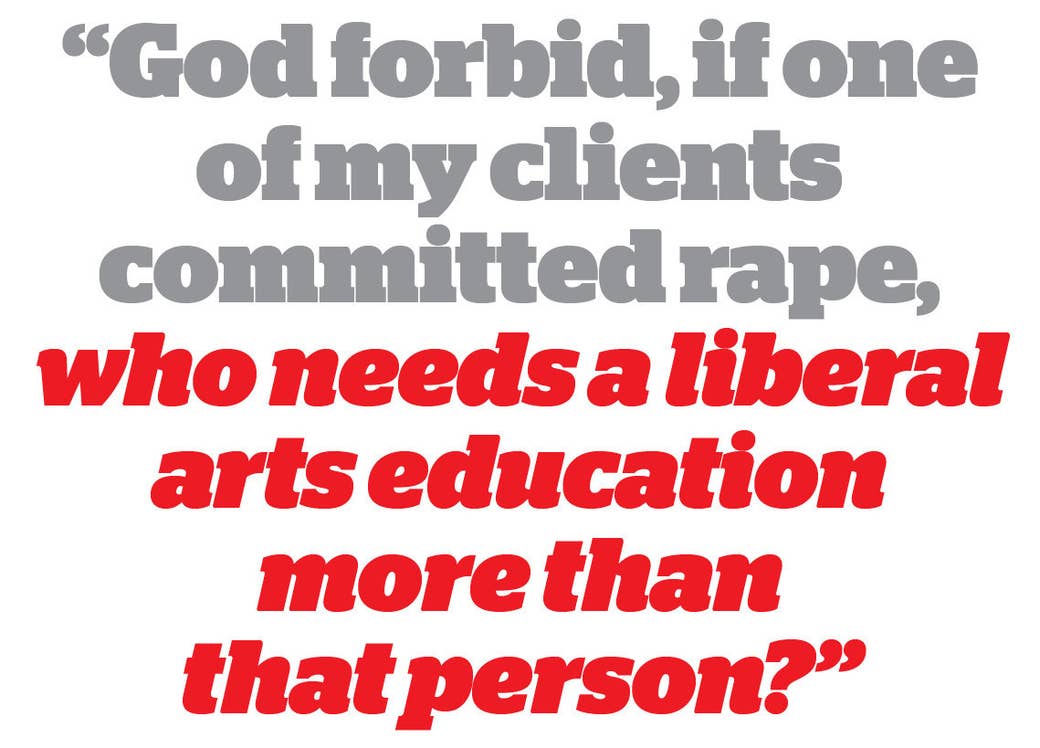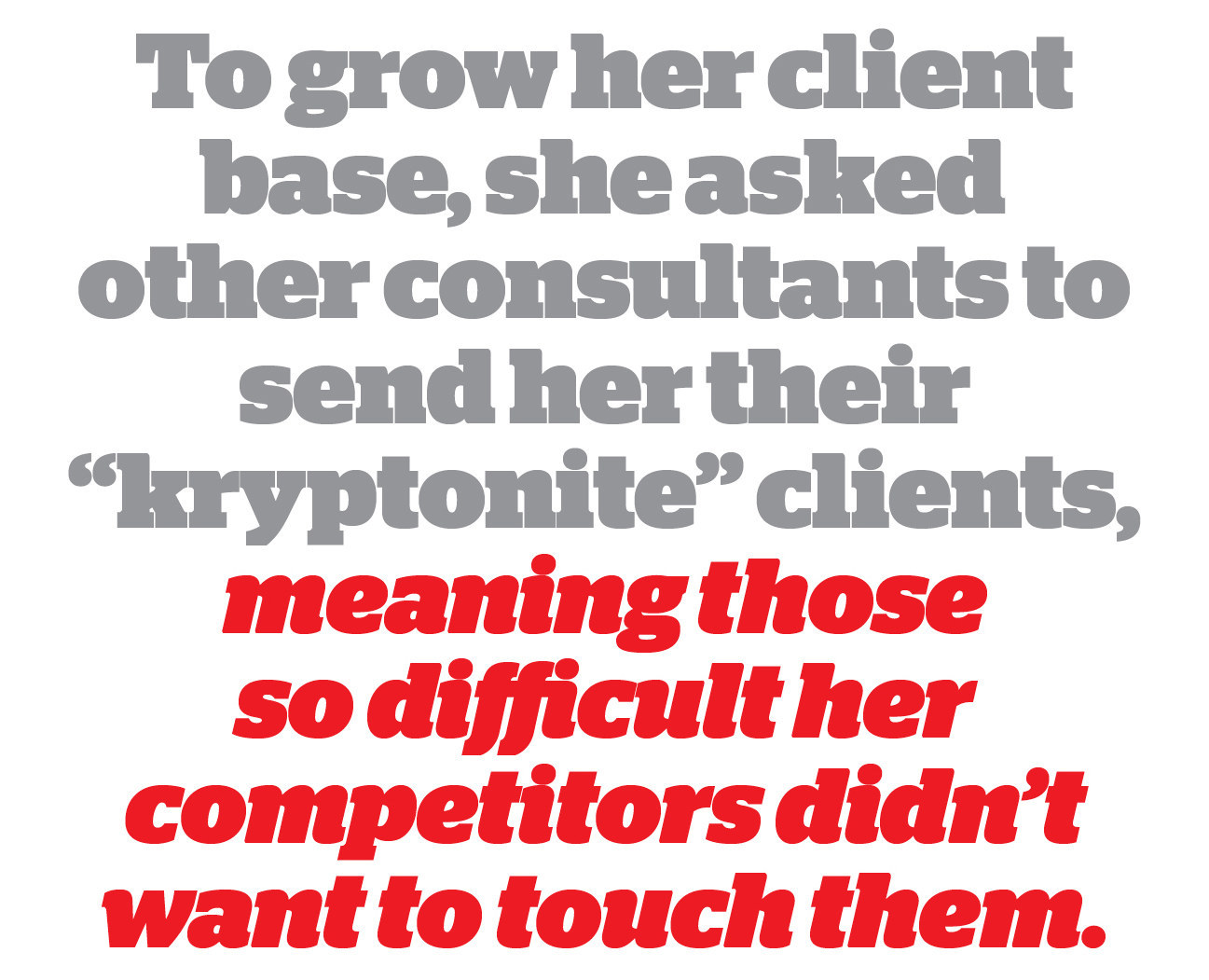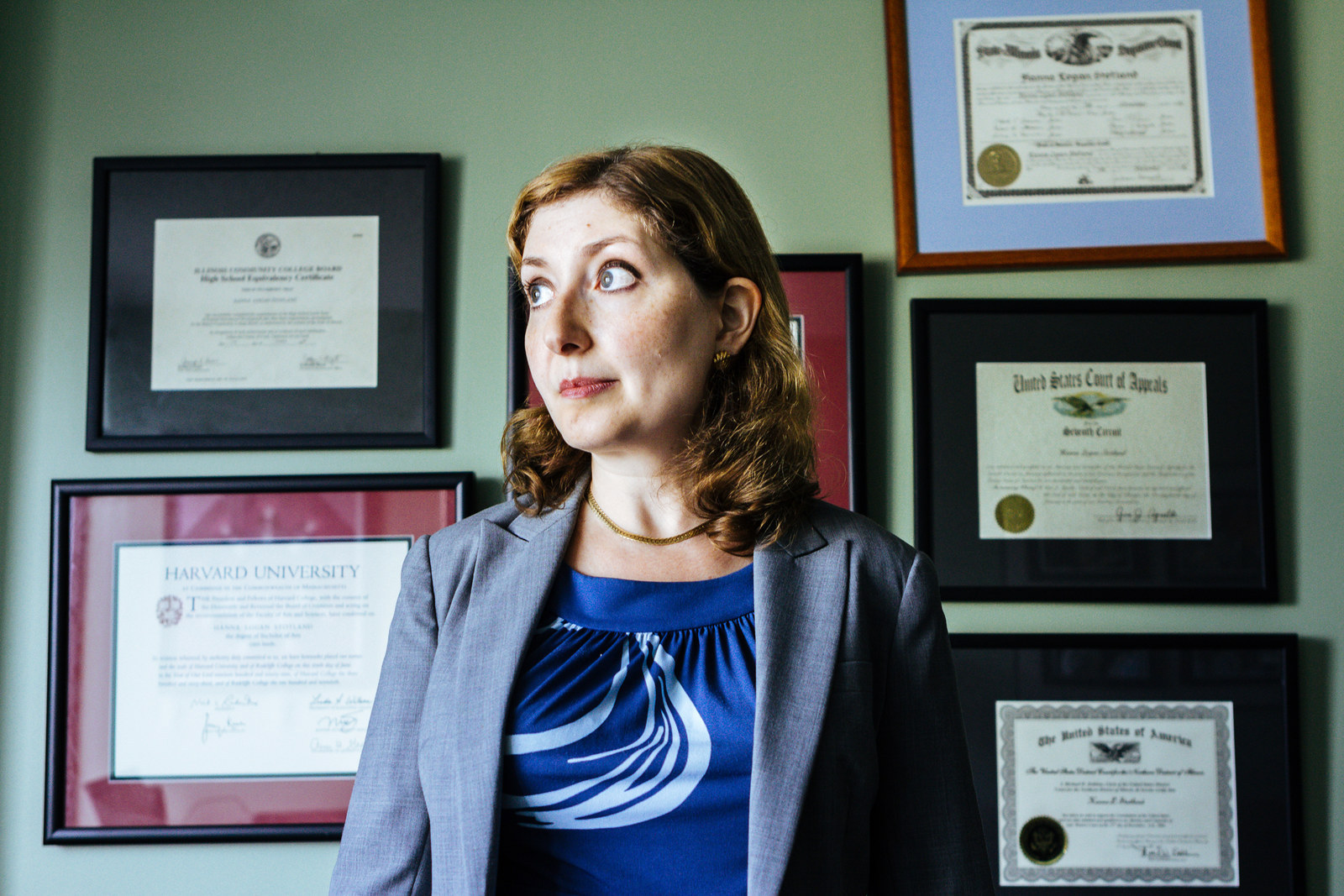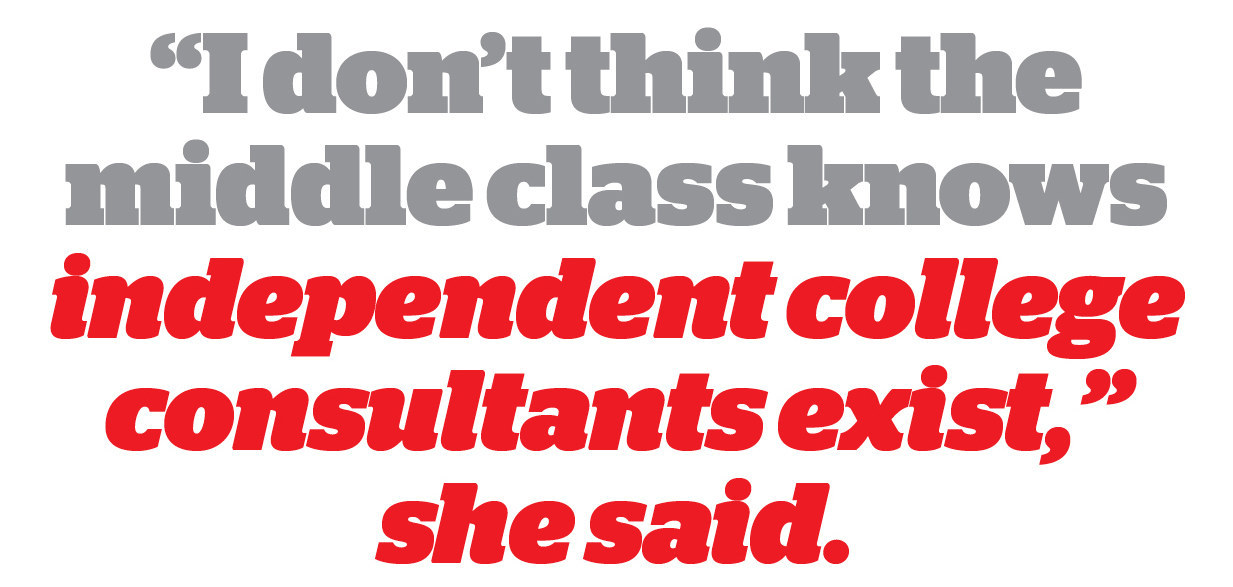
The 19-year-old fraternity brother was “seven or eight beers” into a night of partying at his northeastern state school when a girl he had previously hooked up with drunkenly asked him to escort her home. She kissed him as they stumbled down the road together, which he took as an invitation to follow her into her dorm, where they started having sex. That’s when he noticed she was more out of it than she had seemed. When he asked if she was OK or whether she wanted him to leave, she said she wasn’t sure, so he left. About a month later, she reported him to their university, which ultimately found him responsible for sexual misconduct.
That’s how the young man recounted his side of the story to Hanna Stotland via Skype one afternoon in July. This time, no one was going to challenge his version of the facts. His perception of the “incident,” as Stotland tactfully called it, was the only one that mattered.
Stotland listened intently to the teenager, only interrupting when she sensed he needed encouragement to power through some of the more awkward points in his story. She widened her eyes when he brought up his accuser’s drug use, clucked her tongue when he said he thought her friends convinced her to report him, and gently rephrased his more ambiguous claims. “So she seemed regular drunk, not crazy dangerous drunk,” Stotland offered, after the teenager said his accuser didn’t appear to be blacked out. “That’s a good way to put it,” said his mother, who stayed offscreen but chimed in every so often with pertinent details. She asked Stotland why she needed her son to rehash the night that was so painful for him to remember.
“I want to have a complete story so I can say, ‘Here is your best spin,’” Stotland explained. She does not advocate lying — for one thing, it’s too risky — but her version of “honest disclosure” is a favorable retelling of the truth.
“This is not a story of you being a danger to the community,” Stotland said. “It’s a story of a mistake of judgment and communication.” By the end of the session, she had outlined an action plan and reassured the teenager that he wouldn’t have to go to community college, as he had feared, if he followed her advice.
“This is a setback, not a funeral,” she told him.
Stotland may be the only admissions consultant in the country who actively seeks out clients who have been disciplined for sexual misconduct, according to prominent lawyers and advocates for accused students. In the midst of a national movement that has put pressure on universities to adjudicate sexual misconduct cases more quickly and crack down harder on perpetrators, it’s a lucrative business to be spearheading. Accused students pay her hundreds of dollars an hour to help them brainstorm and edit their transfer application essays, advise them on how much to disclose from their tarnished disciplinary records, and find a school where they might stand a chance of getting in that’s also a good fit.
Stotland said she’s gotten pushback from people who can’t imagine advising students accused of sexual assault. “They’re like, 'So then you’ll put them on another campus to rape again?'” she said. “I’m like, 'As opposed to them dying?'” But she sees the college adjudication system as a deeply flawed process that fails both accused students and their accusers. (Stotland said she’d love to counsel sexual assault survivors, too, but said none have sought her services so far.) Most importantly, she doesn’t believe the former should be denied a second chance at a college education.
"I'm an impassioned feminist,” Stotland said. “But there's nothing feminist about incompetence."
She also doesn’t see anything wrong with turning a profit while the fight over how schools should handle campus sexual assault plays out across the country.
Just because a student is found responsible for sexual misconduct by their university doesn’t mean they were convicted or even charged with a crime through the criminal justice system. Under federal equity law Title IX, which prohibits sex discrimination, students can report sexual misconduct to their schools even if they don’t want to go to the police, and administrators must use a lower standard of proof to swiftly determine their case. Accused students don’t have the same due process rights as they do in court. But instead of jail time and a criminal record, they receive disciplinary sanctions, such as suspension or expulsion in the most extreme cases.
The problem is that no one knows where these students should go next. That’s where Stotland comes in.
So far, all of Stotland’s clients accused of sexual misconduct have transferred to four-year schools, she said, including elite private colleges and well-regarded public research universities. (Stotland didn’t want to name them on the record, because she said she didn’t want to “punish” them for admitting her clients, but she shared emails and texts from satisfied clients with BuzzFeed News.) In the process, she helps her clients recover emotionally, said Sherry Warner-Seefeld, whose son was accused and later cleared of sexual misconduct by his university. (Warner-Seefeld has since co-founded an advocacy group, Families Advocating for Campus Equality, or FACE, for students who have been similarly accused, and started referring clients to Stotland after Stotland spoke at a FACE conference last April.) “She gives them back some faith,” Warner-Seefeld said, “and some ways to trust in the system again.”
Stotland said she never asks whether her clients are guilty of a crime or not — it’s like being a criminal defense attorney, she said — but, even if they are, it’s not clear to her that “banning them from getting an education makes the community safer,” she said.
“God forbid, if one of my clients committed rape, who needs a liberal arts education more than that person?”

Stotland, 40, conducts her Skype counseling sessions from her cozy apartment in Chicago’s tony Gold Coast neighborhood, where she lives with her soon-to-be husband (they’re getting married in August). She’s a two-time Harvard graduate and former lawyer with over a decade of experience in college and law school admissions consulting. But before all that, she was a troubled teenager who flunked out of her private high school.
Instead of going to college, Stotland got her GED and worked as a museum guide. Eventually, she attended Bryn Mawr before transferring to Harvard as a 22-year-old junior. Stotland can’t talk about Harvard without beaming: Her experience there was “stereotypically ideal” and she was was “deliriously happy,” she said. She still uses her Harvard email address.
As a student admissions guide, Stotland often told visitors her life story, and parents started taking her aside to quietly ask her whether she could help the wayward teenagers they knew. She started informally consulting on the side around the same time she went to Harvard Law, but didn’t start her full-time business until 2013, after a six-year legal career and a stint as a law school career counselor. To grow her client base, she asked other consultants to send her their “kryptonite” clients, meaning those so difficult her competitors didn’t want to touch them.
“I’d say, ‘Send me your your addicted, your convicted, your expelled, your eating disordered,’” Stotland said. Now she counsels 20 to 25 high school seniors a year, a few of whom are those “special cases.” Another two dozen or so are college students with checkered pasts. But she didn’t get any calls about sexual misconduct until January 2014, a few months before the White House announced its task force on the issue following activist efforts and increased public awareness. Since then, it’s been “an explosion,” Stotland said. The number of calls, most of which come from frantic mothers, has gone from one a month at most to one or two a week.
Stotland likes to describe herself as “Pollyanna-ish” about education. She doesn’t see herself as giving her clients a second chance, just “helping them try to earn one.” But she’s also a enterprising businesswoman capitalizing on a moment in time when the debate over how colleges should address sexual assault has reached a fever pitch.
Before 2011, few college students filed federal complaints alleging violations of Title IX. When they did, the Department of Education rarely paid attention. In recent years, government rulings and a national student grassroots campaign that publicly shamed schools for supposedly mishandling sexual assault have led to a White House campaign, bipartisan legislation, and a sharp increase in federal investigations.
It’s not just sexual assault survivors who have been able to drum up outrage for their cause: A growing number of activists are organizing on behalf of accused students, too. They claim that panicked college administrators anxious to protect themselves from government probes and student lawsuits are putting accused students through “kangaroo courts” and punishing them unfairly. More than 50 lawsuits have been filed against universities by students found responsible for sexual misconduct in the last two years.
But Stotland tells her clients that suing isn’t the only way to continue their education. Accused students rarely win in court, and even if they do, that doesn’t mean the accusation won’t follow them to another school. Two states, New York and Virginia, recently enacted laws requiring colleges to note whether a student was disciplined for sexual misconduct on their transcripts, lest they try to hide their record when applying to other institutions. In general, Stotland believes it’s better to tell your version of the truth instead of having someone else tell it for you in, say, an anonymous letter to a dean.
That’s just one of the tips she provides to clients who are trying to navigate this landscape, which has attracted a lucrative cottage industry of college sexual misconduct consultants, available to ensure that schools comply with federal laws, along with lawyers who specialize in representing accused students. But most admissions counselors balk at helping accused students or simply don’t know how to, lawyers and activists for accused men said. The accused have few champions, and the ones they do have are often conservative or antifeminist, such as men’s rights activists. Stotland, in contrast, is a discreet professional without a political agenda who has a “particular sympathy for the underdog” because of her own past, said attorney Justin Dillon, a partner at Kaiser, LeGrand & Dillon PLLC who often connects her with his clients.
Stotland said she disagrees with some other advocates in the field, including a few who spoke alongside her at FACE’s clandestine conference last April, but that she didn’t want to comment further because she didn’t want to “alienate” families of accused men. Warner-Seefeld said she had referred around 20 families to Stotland since then. Stotland “inspires trust rather quickly,” she said.

Stotland has counseled a high schooler who pleaded guilty to sexual assault after he was already accepted into but before he entered an elite university, as well as college graduates who are unsure whether to disclose past transgressions on law school applications or for jobs that require security clearance. But she said most of her clients who have been found responsible for sexual misconduct are undergraduate students seeking to transfer elsewhere after being suspended or expelled. None of her clients so far have been accused of using force or drugging their purported victims, she said, and were instead involved in what she calls "gray" situations — although she acknowledged that it's not as if someone can't be raped by a partner, or in a situation where both people are very drunk. No matter the specifics, Stotland comes well-prepared with key sound bites that she employs in counseling sessions and presentations.
One is “don’t admit to things you didn’t do,” but do admit to anything you did. She tells clients that their “job is to get in, not to convince them you are innocent,” but most have not actually been charged with the crime of sexual assault, and Stotland ensures they make that clear while also humbly admitting to lesser offenses, such as drinking underage or hurting their accusers’ feelings. Stotland is emphatic about the need for full disclosure — although what she means is full disclosure of her clients’ side of the story, which is typically that they didn’t actually commit rape, just made some bad decisions. It’s not as much about morality as it is about the futility of trying to cover up your past in the internet age.
Another sound bite is that “time is your friend,” meaning it might be prudent for someone to take a year or two off to “rehabilitate” their record and build their resume in their field. Apply to as many schools as possible — 30 is the number Stotland throws out as an example — since the decision will come down to a few administrators who’ll make a gut decision that’s impossible to predict.
Stotland is also insistent that her clients refrain from bad-mouthing college administrators in their essay, which may sound obvious — it’s just like trashing your last boss in a job interview — but is often hard for those who feel deeply wronged by the campus disciplinary process. During Stotland’s recent Skype session with the 19-year-old, the mother asked whether it was ever “beneficial” to criticize the adjudication process. Short answer: No way.
“You always want to convey you understand the school is between a rock and a hard place,” Stotland said. It’s best instead to present the facts in a “dispassionate, calm way” and let readers draw their own conclusions that the decision was made unfairly. She also explained that it would be advantageous to address his accuser’s distress while “disagreeing” that he raped her.
“Nothing you don’t believe should be in there,” she said, “so stop me if I’m saying anything wrong, but, if true, you are really sorry that you caused her distress. You can say, ‘That’s never what I intended and I’m really sorry about that,’ and, ‘Oh my god, this is never going to happen again. You can completely trust I am going to be so careful from now on.’”

The 19-year old’s assignment was to come up with a realistic list of schools that fit his academic goals and also accepted automatic transfers, as well as start working on his essay. She didn’t have to persuade him to admit regret.
“If a girl asks you to walk her home, never try to hook up with her,” he said when asked what he learned from his experience. “The reason you are walking her home is because she couldn’t by herself, and that makes you responsible for her. Trying to make it into a sexual encounter is kind of irresponsible.”
But the contemplative moment did not last long. Soon he was back to expressing relief and elation that he would not have to go to community college and live at home for the next couple of years, which “sounded terrible.”
“I still want to have my college experience,” he said. “That’s one of the things that really bummed me out.”
There’s only one impediment to the success Stotland all but promises her clients: They have to be able to afford her.
“I don’t think the middle class knows independent college consultants exist,” she said.
Stotland won’t disclose her fees on the record, but her services cost in the hundreds per hour, although some clients end up wanting only a few hours of her time. Her clients can also afford to pay full tuition: Colleges may be willing to accept students who have been found responsible for sexual misconduct, but it’s next to impossible for those students to secure scholarships, she said.
Thus, Stotland’s clients, and by extension those students accused of sexual misconduct who get back into school with her help, are those who can afford to buy themselves out of trouble. The socioeconomic implications of that trouble Stotland, she said, because she thinks everyone deserves a chance at an education, even if they have been convicted of a crime.
“Do you think if they are flipping burgers at McDonald’s they can’t rape somebody there?” she said.

The consequences for sexual assault in the criminal justice system are much worse than getting expelled from college for a disciplinary infraction and working at a fast-food restaurant. Rape is a felony, and those who are found guilty serve jail time and must register as sex offenders. In those cases, the decision to pursue a college degree can be much more controversial. Trent Mays, one of the Steubenville High School football players who served a two-year sentence in a juvenile detention facility for raping and taking nude photos of of a 16-year-old girl, recently enrolled in a community college in Nelsonville, Ohio. When the news broke, reporters asked the school to explain itself.
But if anything could help the Steubenville High rapists “grow them into good men, surely education is that thing,” Stotland said. “I have more hope for the world if they are allowed to go to college than if they are not, assuming a college decides they want to take them.”
Stotland said she pushes back when a wealthy family acts like their son’s life is over just because he has to attend a less selective college, or redo an academic year. But she’s not exactly advertising pro bono counseling for less privileged clients, either. In fact, she charges all of her “kryptonite” clients a higher rate.
Call Stotland an opportunist or a lifesaver — either way, she said she’s collecting clients at rapid speed who want to hire her for a job that few people even know exist. During a recent afternoon, it took Stotland only half an hour to put an anxious mother calling for the first time at ease.
Her son, a rising senior, had recently been found responsible for sexual misconduct, and she wanted to know whether he still had time to transfer to another school for the fall. Stotland encouraged her to slow down if her son wanted to attend a good school, but said that it was definitely possible if he was willing to lower his standards: Either way, he would turn out just fine.
"You’re the third inquiry I’ve gotten in the last 10 days from someone in this exact situation," she said. "It’s discouraging that it’s happening a lot, but I hope it’s encouraging that first of all he has a lot of company ... this does not have to be the end of the road at all."
By the end of the call, the two women were laughing, and Stotland told the mother she was glad she “still had her sense of humor.” The next day, she called Stotland to officially hire her, credit card in hand, ready for her to get to work.
